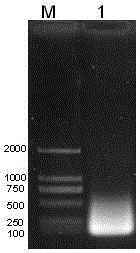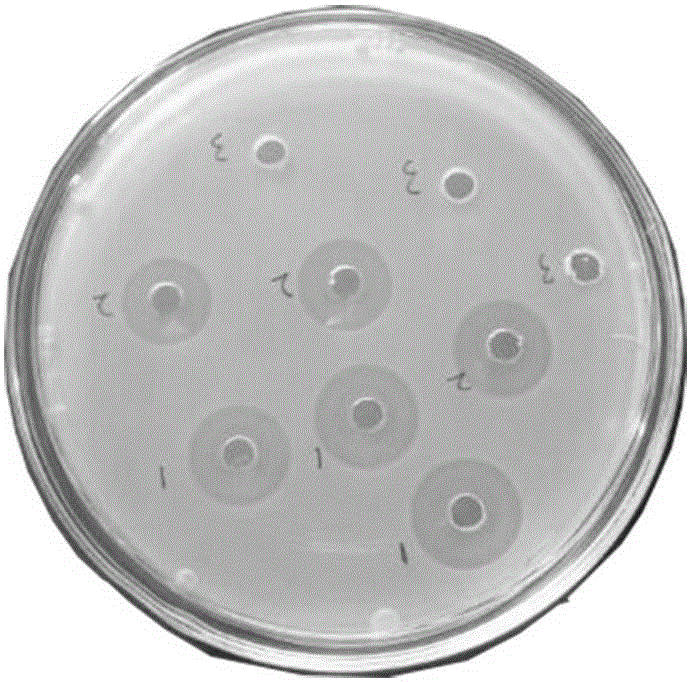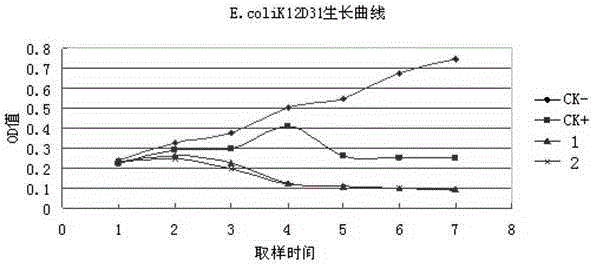Method for expressing Cecropin DC1 through insect cells
An insect cell and antimicrobial peptide technology, which is applied in the field of insect cell expression antimicrobial peptide CecropinDC1, can solve the problems of limited expression, easy loss of target genes, unstable plasmid transformants, etc., and achieve high bactericidal potency and high biological activity.
- Summary
- Abstract
- Description
- Claims
- Application Information
AI Technical Summary
Problems solved by technology
Method used
Image
Examples
Embodiment 1
[0025] Cloning of Antimicrobial Peptide CecropinDC1 Gene
[0026] According to the needs of gene modification and cloning of the antimicrobial peptide CecropinDC1, primers were designed and synthesized using Primerpremier5.0 software:
[0027] P1: 5'ATGAAATGGAAGTTGTTCAAAAA3';
[0028] P2:5'GTTAGCCAAAGGCAGTAGC3'
[0029] The PCR amplification reaction is: pre-denaturation at 93°C for 5 minutes; denaturation at 93°C for 30 seconds; annealing at 58°C for 60 seconds; extension at 72°C for 1 minute; after 30 cycles, extension at 72°C for 10 minutes, and incubation at 4°C.
[0030] Use 1% agarose gel electrophoresis to carry out PCR product analysis to antimicrobial peptide CecropinDC1 gene (the result is as follows figure 1 Shown) Swimming lane 1 is compared with the DNA molecular weight marker (DL2000), and the target fragment of about 140 can be clearly seen, indicating that the antimicrobial peptide CecropinDC1 gene was successfully synthesized. Gel Extraction Kit (GelExtract...
Embodiment 2
[0032] get recombinant virus
[0033] The constructed recombinant transfer vector was co-transfected with Sf21 insect cells with the polynucleated polyhedrosis virus AcNPV-DNA of Spodoptera californica, and the recombinant virus expressing the antimicrobial peptide CecropinDC1 was obtained in the following manner.
[0034] Add 2 μg recombinant transfer vector DNA, 10 μg AcNPV-DNA and 0.8 ml co-transfection buffer to a 1.5 ml sterilized Eppendorf tube, incubate the mixture for 30 min at room temperature and co-transfect Sf21 insect cells in logarithmic growth phase; then After co-transfection, Sf21 cells were washed twice with serum-free medium Sf-900IISFM medium (without antibiotics or other additives), and then cultured with fresh medium containing 10% FCS at 27°C for 4~6d , the medium supernatant was collected as the virus stock solution to screen the recombinant virus, and the recombinant virus was screened by plaque to obtain a virus solution, which was named as the recomb...
Embodiment 3
[0036] Extraction of recombinant baculovirus
[0037] 1) Take a 1.5ml centrifuge tube and add 20μl ProteinaseK solution.
[0038] 2) Add 200 μl serum or plasma to the centrifuge tube, then add 200 μl BufferGB, and vortex for 15 sec.
[0039] 3) Incubate at 56°C for 15 minutes, centrifuge briefly, and collect the solution on the tube wall to the bottom of the tube.
[0040] 4) Add 250 μl absolute ethanol, vortex for 15 sec, place at room temperature for 5 min, centrifuge briefly, and collect the solution on the tube wall to the bottom of the tube.
[0041] 5) Put a SpinColumnsCG * Put it into CollectionTubes (2ml), transfer the solution obtained in the previous step to a centrifugal adsorption column, centrifuge at 10000rpm for 30sec, and discard the waste liquid in the collection tube.
[0042] 6) Add 500 μl of BufferGD to the adsorption column, centrifuge at 10,000 rpm for 30 sec at room temperature, and discard the waste liquid in the collection tube.
[0043] 7) Add 500...
PUM
| Property | Measurement | Unit |
|---|---|---|
| The average diameter | aaaaa | aaaaa |
| The average diameter | aaaaa | aaaaa |
Abstract
Description
Claims
Application Information
 Login to View More
Login to View More - R&D
- Intellectual Property
- Life Sciences
- Materials
- Tech Scout
- Unparalleled Data Quality
- Higher Quality Content
- 60% Fewer Hallucinations
Browse by: Latest US Patents, China's latest patents, Technical Efficacy Thesaurus, Application Domain, Technology Topic, Popular Technical Reports.
© 2025 PatSnap. All rights reserved.Legal|Privacy policy|Modern Slavery Act Transparency Statement|Sitemap|About US| Contact US: help@patsnap.com



